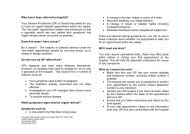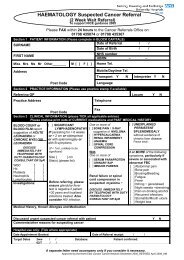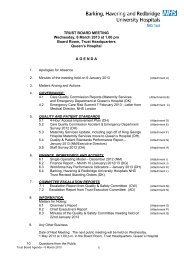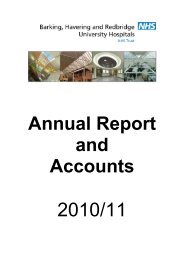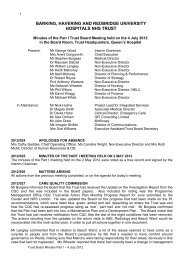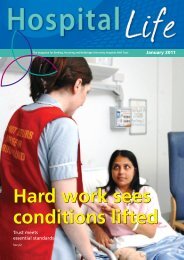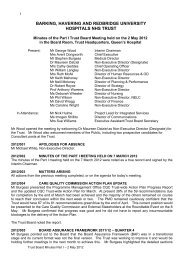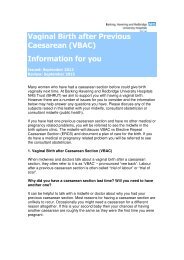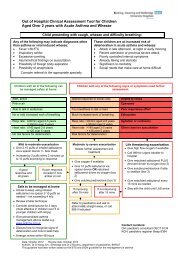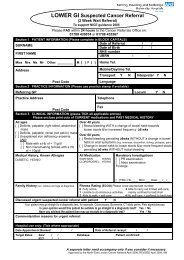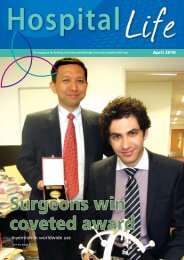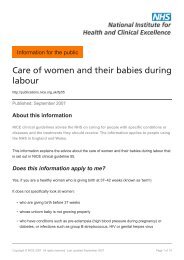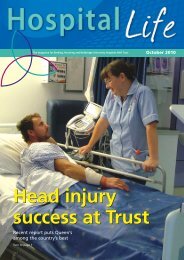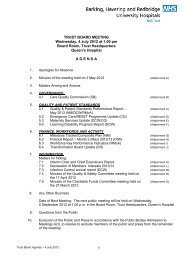Trust Board papers November 2012 - Barking Havering and ...
Trust Board papers November 2012 - Barking Havering and ...
Trust Board papers November 2012 - Barking Havering and ...
Create successful ePaper yourself
Turn your PDF publications into a flip-book with our unique Google optimized e-Paper software.
The data on the previous page has been presented by training subject, to reflect the Skills for Health National Training Framework. This sets minimum training st<strong>and</strong>ards <strong>and</strong><br />
frequency <strong>and</strong> promotes consistency <strong>and</strong> avoids duplication between organisations. Therefore Conflict Resolution, Equality, Diversity <strong>and</strong> Human Rights are now included.<br />
This format also reflects previous discussion <strong>and</strong> agreement to not report by programme but to report by subject.<br />
Detailed reports for Resuscitation, RN, HCA <strong>and</strong> ODP M<strong>and</strong>atory are still provided.<br />
Subject Matter Experts (SME) are aware of their responsibilities to drive up compliance in their area, this is dependent on them being provided with robust data<br />
Fire <strong>and</strong> Health <strong>and</strong> Safety have now been separated into specific Subject Matter to reflect the national requirements.<br />
Infection Control figures now include the Risk Management St<strong>and</strong>ard (RMS) requirements for H<strong>and</strong> Hygiene training which is now included on <strong>Trust</strong> Induction <strong>and</strong> on<br />
M<strong>and</strong>atory programmes.<br />
Conflict Resolution training has not been regarded as a m<strong>and</strong>atory priority. However in view of the CQC findings this will need to be mapped into the ongoing work on cultural<br />
change which will improve compliance. to complete this successfully there will need to be a resource review.<br />
Did Not Attend (DNA) data is shown on the next page to reflect requirements of internal audit, <strong>and</strong> this is followed up by the SME.<br />
The data demonstrates that release <strong>and</strong> uptake remains the biggest challenge as the amount of places offered for most subjects exceeds the amount required. Low compliance<br />
rates for Information Governance are reflective of the change of frequency from 3yearly to annual. Safeguarding children level 2 uptake saw a drop as nursing staff are now<br />
required to do this <strong>and</strong> not level 1 as was previously the case.<br />
In April <strong>2012</strong> the <strong>Trust</strong> launched new M<strong>and</strong>atory programmes specifically designed to improve compliance for other clinical staff groups <strong>and</strong> for admin <strong>and</strong> clerical staff.<br />
It is anticipated that should the <strong>Board</strong> endorse the proposal to implement the WIRED system, compliance will rise across subjects as data will be timely, transparent, accurate<br />
<strong>and</strong> align to the Training Needs Analysis <strong>and</strong> available to all Managers.<br />
CONFLICT RESOLUTION<br />
HEALTH & SAFETY<br />
<strong>2012</strong> Q1 <strong>2012</strong> Q2 <strong>2012</strong> Q3 <strong>2012</strong> Q4 <strong>2012</strong> Q1 <strong>2012</strong> Q2 <strong>2012</strong> Q3 <strong>2012</strong> Q4<br />
Number of Staff<br />
Requiring Training 447 470 472<br />
Number of Staff<br />
Requiring Training 1408<br />
Actual Number Trained 131 135 147 Actual Number Trained 915<br />
<strong>Trust</strong> Overall Scorecard - September <strong>2012</strong> - Workforce Information Department



![[4] Biopsy Leaflet.pub - Barking, Havering and Redbridge University ...](https://img.yumpu.com/51285530/1/190x134/4-biopsy-leafletpub-barking-havering-and-redbridge-university-.jpg?quality=85)
